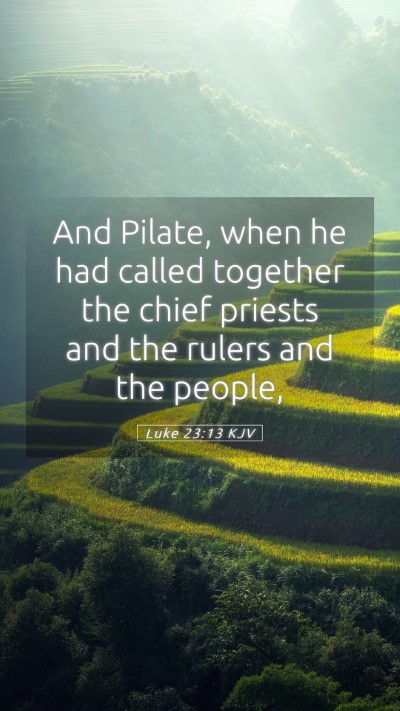Understanding Luke 23:13
Bible Verse: "And Pilate, when he had called together the chief priests and the rulers and the people," (Luke 23:13)
Overview of Luke 23:13
Luke 23:13 occurs during the trial of Jesus before Pontius Pilate, where he addresses a gathering of the religious leaders and the populace regarding the accusations against Jesus. This moment is significant in the narrative of Jesus’ crucifixion, as it sets the stage for Pilate’s eventual declaration about Jesus’ innocence and the crowd's persuasion for his execution.
Commentary Insights
Matthew Henry's Commentary
Matthew Henry explains that this verse captures a pivotal moment where Pilate, as the Roman governor, seeks to clarify the charges against Jesus but also underscores the influence of the Jewish leaders. Henry highlights that Pilate's need to gather the chief priests and rulers indicates his recognition of the gravity of the situation and the political pressures involved.
Albert Barnes' Commentary
Albert Barnes provides insight into Pilate's actions, noting that he attempted to discern the truth of the accusations brought against Jesus. Barnes emphasizes that the gathering of leaders signifies a formal inquiry and illustrates the dynamics of power and authority during Jesus' trial. This context reflects on the broader theme of judicial injustice as Jesus faces fabricated charges.
Adam Clarke's Commentary
Adam Clarke delves into the historical context, observing this trial as a farce marked by political expediency rather than justice. He suggests that Pilate's calling together of the chief priests and rulers reveals an acknowledgment of the public sentiment and a pathetic attempt at governance, showcasing the tension between Roman authority and Jewish leadership.
Key Themes and Lessons
The examination of Luke 23:13 reveals several key themes:
- Judicial Injustice: The verse portrays how legal proceedings can be influenced by public opinion and political maneuvering, leading to an injustice in the case of Jesus.
- Authority and Accountability: Pilate's role as a governor highlights the responsibilities of authority figures to seek justice rather than capitulate to mob mentality.
- Public Perception: The involvement of the chief priests and rulers signifies the impact of leadership on community decisions, reminding us of the power dynamics within societal structures.
Applications of Luke 23:13
Readers today can reflect on this scripture in various ways:
- Understanding Power Dynamics: Analyze how leadership can influence justice and decision-making in contemporary situations.
- Seeking Truth: Emphasize the need to investigate claims fully and remain anchored in truth, especially during times when public sentiment leans towards hysteria.
- Awareness of Public Opinion: Be mindful of how popular opinion can sway decisions, particularly in moral and ethical contexts.
Related Scripture Cross References
- Matthew 27:1-2 - The assembling of the chief priests and elders for the trial of Jesus.
- John 18:28-38 - A detailed account of Jesus’ trial before Pilate.
- Luke 23:4 - Pilate’s initial declaration of Jesus' innocence.
Conclusion
Luke 23:13 serves as a critical moment in the Passion narrative, offering insights into the judicial system of Jesus’ time, the influence of authority, and the quest for truth amid adversity. By studying this verse, believers can enhance their Bible study insights and engage more deeply with the meaning of Bible verses related to justice, authority, and leadership challenges.


